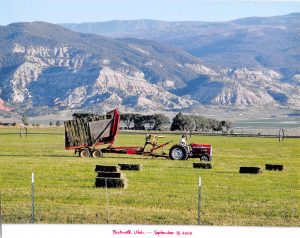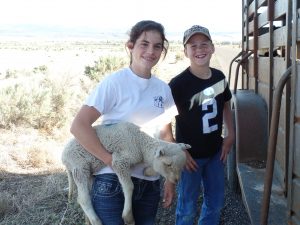
The Loa, Utah community doesn’t always see eye-to-eye with the government, according to Loa resident Mary Ellett.
While some government programs “help (them) to be prosperous at times,” Ellett said her family and her neighbors have run across problems with the government’s polices.
“The increase of the fees on state land to keep the cattle went up six times to what we paid for the cattle to be on federal land,” Ellett said.

BYU public health major Maggie Ellett grew up in Loa, a town with a population of 572, where her dad has been farming land for 34 years and everybody in town knows each other.
Maggie said some of the laws the government has passed, disrupted the living of those in rural Utah. One law regulates water use and the way farmers can share water. They can only use a certain amount to water their crops. Maggie said her dad’s crops aren’t getting the water they need.
Another law restricts where sheep can graze, Maggie said.
“We don’t really love it when the government steps in because they don’t see it from our view,” Maggie said. “We do have some people in our town in the government, so they do give us a voice.”
BYU political science professor Adam Brown said almost 80 percent of Utahns live in the five most urbanized counties. State officials wanted to ensure all four U.S. House districts would contain a mix of rural and urban areas, mirroring the state’s overall rural-urban balance, so none of Utah’s members of Congress would overlook rural concerns.
Those in urban and rural areas want different things when it comes to the federal public land, Brown said. He said urban residents want the land for recreation and escape, whereas rural residents want it for drilling and expanding production.

Brown said the redistricting process was meant to ensure strong representation of rural voices, which make up less than 20 percent of the state with no effort to ensure balanced representation of non-Republican voters, who form a larger minority. He said the district maps were divided so the state’s most heavily urbanized and most liberal areas had less political influence.
“I’m not really sure it’s the rural voters who are underrepresented,” Brown said.
Brown said the issues of urban areas differ from those of rural areas. He said urban issues include air quality and building freeways and roads, whereas rural areas are concerned about … population and schools, which “can lead to school closures” and “very long bus rides for the remaining children.”
Maggie said she enjoys coming from such a small community.

“Living in a small town has been a blessing, and I know a lot of my classmates want to move back,” Maggie said. “I love having the opportunity to go explore the world, but it’s nice having a safe haven of home.”
Coming from a small town enforces some core values that have carried Maggie through life, she said.
“The most important value is hard work,” Maggie said. “My dad owns a farm, so lots of hard work trickled into everyday life.”
Mary Ellett said something she cherishes about living in a rural area is learning to respect the land and understand your role as a provider.
“We are close to the earth,” Mary said. “If you don’t care for your crops and animals, then you won’t have anything to survive.”




